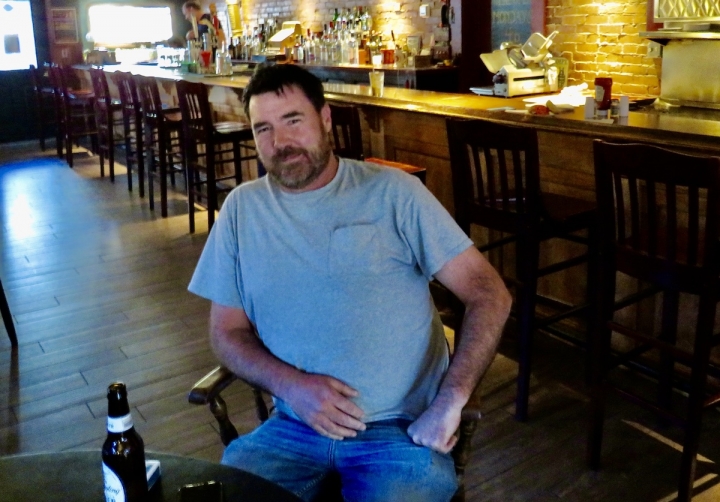
Lisa Reisman Photo
The Contois Tavern cheeseburger.
Fresh ground beef. Grilled onions. Tomato. American cheese. Poppy seed bun.
No spices or seasoning or special sauce. No breadcrumbs. No meat thermometer needlessly complicating the process.
This cheeseburger can be found at the tidy brick building that is Contois Tavern on the corner of Nicoll and Eagle Streets.
The recipe for the cheeseburger has been passed down through the generations since 1934, when the establishment officially opened in the Goatville section of East Rock.
The recipe has never been written down. There is, in fact, no evidence the cheeseburger is even available. The place offers no written menu.
The secret is simple, according to Billy Contois, the amiable architect of the burger and the fourth-generation representative of New Haven’s oldest family-owned bar.
“It’s all in the grill,” he said, setting the tomatoes and caramelized onions atop the burger, as three or four patrons talked baseball in the softly lit space on a recent midday afternoon.
“The grill is probably 65 years old,” he said. “That’s all the flavors from 65 years. I could take the same meat home, and it’s not as good.”

Contois said his family has been at the same corner since 1922. His great grandfather, Walter E. Contois, “had speakeasies all over New Haven, and this was one of the places.”
On the ground floor were a butcher shop and a shoe repair shop. “He had some things going on in the basement,” Billy Contois said, greeting bartender Jody Whelan as she came through the back door. “There was a sort of secret tunnel off the sidewalk on the Eagle Street side that cops used after their morning shift.”
After repeal, in 1934, the secret tunnel was sealed, and Contois Tavern went legal. The business stayed in the family. After college in Rhode Island and a stint doing sales for a beer company, Billy came back.

Billy Contois, fourth generation behind the grill at New Haven’s oldest family-owned bar.
“I was kind of waiting for a real job 25 years ago, and I’m still looking for that real job,” he said, grinning. “But this is a pretty nice thing to fall back on.”
“Amen to that,” said a regular a few stools down the bar, who asked not to be identified. “I’ve been coming here since I was 18, and now I’m 58.”
Asked for how the place had changed over four decades, the regular had a two-word answer: “Not much.”
“At some point, they cleaned the walls up and put in a new floor, and they refaced the bar,” he said.
“Birch plywood with solid maple, and a formica top,” said Contois Tavern regular Kevin Beirne of L&E Custom Carpentry in Hamden, seated at a nearby table, who did the work.
That was roughly 2012 or 2013. Around that time, the words Contois Tavern, in small lettering, were stenciled on the windows, Contois said. There was also a discreet shingle hung on the corner of Nicoll and Eagle bearing the name of the establishment.

Contois regular Kevin Beirne, refacer of the original tavern bar.
Until then, there was no sign. There was no website or phone number or posted hours or much to indicate the place was open. Sometimes the front door was unlocked. Sometimes William Contois, Billy’s grandfather, buzzed his customers in.
That’s about all that’s changed, it seems, though there is still no website or phone number. Contois Tavern is still a beer-and-shot bar. There’s still the generous pour, the hearty, inexpensive food — the cheeseburger remains $6 — the cash-only sign, the framed family photos. There’s still the cardboard cutout of former regular Paul Tynan.
“When he went back to Ireland, we got this to remind ourselves that he’s still with us,” Beirne said.
“If somebody new comes in, beside the regulars, it’s because they know someone who comes in here, for the most part,” Contois said. “Friend of a friend, that kind of thing. And then they either keep coming or they don’t.”
Covid disrupted those regular rhythms. “Before, I could set my watch to who was coming in,” Contois said, setting the cheeseburger on a paper plate and placing it on the bar. “Now, it’s different. We opened up the lot in the back, but some of our guys are older, retired, and they haven’t come back for obvious reasons.”
That said, for the regulars, it remains a refuge. “I come here to get left alone,” said one.
“If you know, you know,” Whelan said, as she opened a bottle of beer for one of the patrons. Her mother grew up four houses down the street. Her grandfather was a New Haven cop. “He came here,” she said. “So did my mother. I’ve known the family forever. They needed help one day, and I was like, ‘Fine, whenever you need it.’ And I’ve been coming ever since.’”

cutout of former Contois Tavern regular Paul Tynan.
The cheeseburger offered more insight into the longevity of the place — and the pull it exerts on its regulars. The meat, which was cooked medium-rare, was tender. Its flavor had a certain smokiness, as though haunted by generations of onions that had passed over its grill.
Then there was the interplay among the tomatoes, onions, and cheese, and the pillow softness of the bun.
As I luxuriated in the taste, I found myself transported to a simpler, more contented, time, captured by an inscription on Goatville painted on the brick exterior.
“In the late 1880’s,” it reads in part, “the area was dubbed ‘Goatville,’ because many of the Irish immigrants kept goats, which tended to wander around the neighborhood. Used by outsiders, the nickname carried a slight contemptuous tone at first, but the natives soon adopted it as a term of affection.”
With that, the back door opened. A man came in, slid onto a stool next to another regular.
“What’s up with you?” he said.
“Not much. Yourself?
“Not much.”